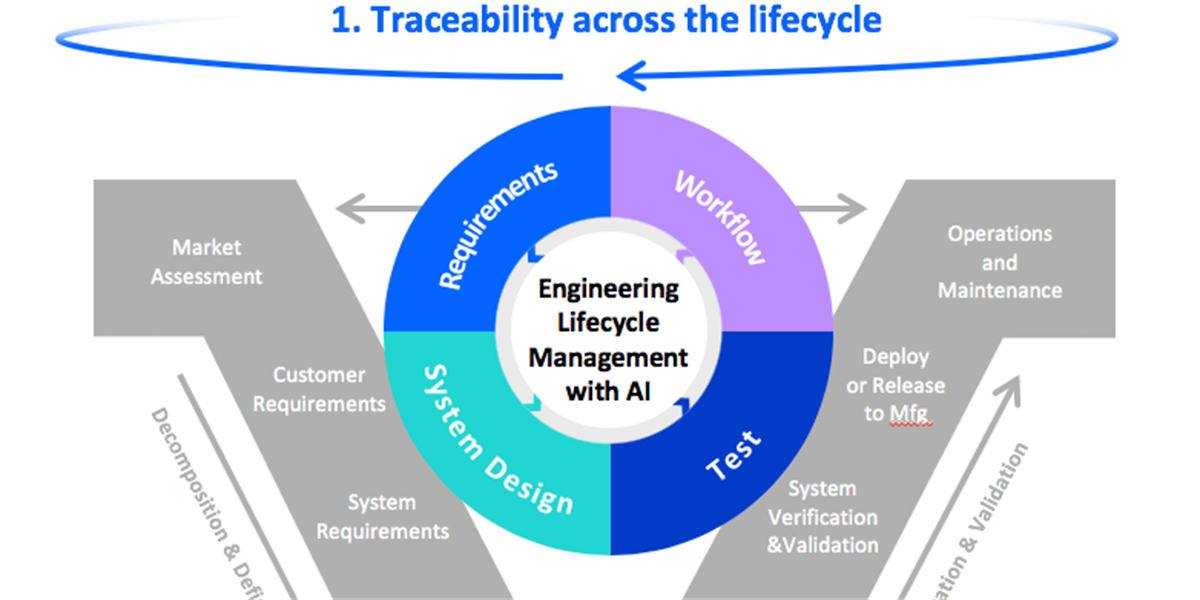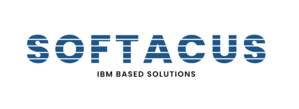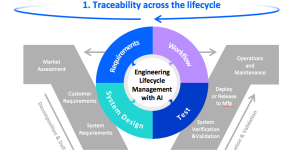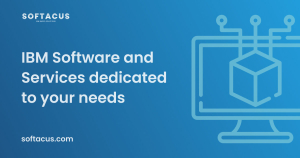Displaying items by tag: Engineering Lifecycle Management
We are pleased to announce that our company has been awarded at the IBM Ecosystem Kick-off DACH 2023 in the category Sustainability Software for exceptional growth in Engineering Lifecycle Management.
With tools and add-ons developed in-house for IBM products, Softacus has managed to demonstrate added value for customers and thus increase their competitiveness.
We look forward to continue working together with IBM to create innovative solutions that will have a positive impact on our society and the world!


Auch dieses Jahr wird Softacus bei der REConf, die vom 24 bis 28. April 2023 stattfindet, sein.
Die REConf (Requirements Engineering Conference) ist Europas führende Konferenz mit Schwerpunkt Requirements Engineering. Auf der Veranstaltung werden neue Methoden, Trends und Tools in Vorträgen, Diskussionsrunden und Workshops diskutiert.
Am zweiten Tag der Konferenz (25 April) um 16:00 Uhr wird unser Solution Director, Jan Jancar, zusammen mit Peter Schedl von IBM, einen Vortrag zum Thema "Traceability - das Salz in der Suppe" halten.
Anforderungen sind der Ausgangspunkt der Entwicklung und somit auch der Traceability für alle Entwicklungsdaten. Projekte stellen heute bereits sicher, dass alle Kundenanforderungen in Systemanforderungen überführt wurden und Testfälle spezifiziert sind. Nicht selbstverständlich ist die Traceability in Verbindung mit KPI’s oder der toolgestützten Impactanalyse bei sich ändernden Anforderungen.
Softacus zeigt gemeinsam mit IBM Best Practices wie sich solche Szenarien mit DOORS und der Engineering Lifecycle Management Lösung einfach abbilden lassen.
Melden Sie sich für RECconf 2023 hier an: https://www.hood-group.com/reconf/anmeldung

AITS Bremen will gather industry suppliers and OEMs, R&D centers, associations and clusters, academia, and public and private organizations to identify further business opportunities and develop partnerships.
More information at https://bremen.bciaerospace.com/

This is session 7 of 7 that covers the IBM ELM tool suite.
IBM Engineering Lifecycle Management (ELM) is the leading platform for today’s complex product and software development. ELM extends the functionality of standard ALM tools, providing an integrated, end-to-end solution that offers full transparency and traceability across all engineering data. From requirements through testing and deployment, ELM optimizes collaboration and communication across all stakeholders, improving decision- making, productivity and overall product quality.
Presented by: Jim Herron of Island Training.
When: Oct 13, 2022 from 09:00 AM to 10:00 AM (PT)
The AUTOSAR Adaptive platform standard has been introduced to cope with the complex software-driven functionality of vehicles, of which autonomous driving is probably the most prominent one. In this webinar, we will look into the workflows implementing AUTOSAR Adaptive components, and we will discuss how AUTOSAR Classic and Adaptive workflows can be combined. OEM and supplier workflow will be highlighted. Furthermore, we will also discuss migration strategies from AUTOSAR Classic to Adaptive.
AUTomotive Open System ARchitecture (AUTOSAR) is a development partnership of automotive interested parties founded in 2003. It pursues the objective to create and establish an open and standardized software architecture for automotive electronic control units (ECUs). Goals include the scalability to different vehicle and platform variants, transferability of software, the consideration of availability and safety requirements, a collaboration between various partners, sustainable use of natural resources, and maintainability during the product lifecycle.
IBM Engineering Lifecycle Management (ELM) is the leading platform for today’s complex product and software development. ELM extends the functionality of standard ALM tools, providing an integrated, end-to-end solution that offers full transparency and traceability across all engineering data. From requirements through testing and deployment, ELM optimizes collaboration and communication across all stakeholders, improving decision- making, productivity and overall product quality.
Speaker:
Moshe Cohen - Senior Offering/Product Manager - Engineering Lifecycle Management
Walter van der Heiden - Owner/CTO
Register here

AUTOSAR classic replaces some proprietary Automotive architectures in order to create consistency and efficiency across the development supply chain for automotive applications. In this webinar we will dive into the AUTOSAR related workflows, from an OEM and from a supplier's point of view. The demo part will focus on how to develop AUTOSAR software components starting from SysML, applying early verification and validation, all the way down to automatic prodcution code generation.
AUTomotive Open System ARchitecture (AUTOSAR) is a development partnership of automotive interested parties founded in 2003. It pursues the objective to create and establish an open and standardized software architecture for automotive electronic control units (ECUs). Goals include the scalability to different vehicle and platform variants, transferability of software, the consideration of availability and safety requirements, a collaboration between various partners, sustainable use of natural resources, and maintainability during the product lifecycle.
IBM Engineering Lifecycle Management (ELM) is the leading platform for today’s complex product and software development. ELM extends the functionality of standard ALM tools, providing an integrated, end-to-end solution that offers full transparency and traceability across all engineering data. From requirements through testing and deployment, ELM optimizes collaboration and communication across all stakeholders, improving decision- making, productivity and overall product quality.
Webinar - IBM ELM SERIES #5: Source Control and Build Management with IBM® Engineering Workflow Sour

This is session 5 of 7 that covers the IBM ELM tool suite.
IBM Engineering Lifecycle Management (ELM) is the leading platform for today’s complex product and software development. ELM extends the functionality of standard ALM tools, providing an integrated, end-to-end solution that offers full transparency and traceability across all engineering data. From requirements through testing and deployment, ELM optimizes collaboration and communication across all stakeholders, improving decision- making, productivity and overall product quality.
Presented by: Jim Herron of Island Training
The Spring 2022 Engineering Lifecycle Management User Group Conference will be virtual from May 16 – 19. Each day’s agenda will run three hours, packed with interesting and valuable information, but also respectful of your busy schedules. This conference will focus on the increasing complexity challenging today’s systems and software development teams.
The forum will promote best practices, collaboration, model-based design, digital thread, and optimal reuse. You will hear from IBM experts, long standing IBM Partners, as well as technical professionals like yourselves. The conference promises to be informative, as well as a great opportunity to exchange views and network with your peers.
IBM Engineering Lifecycle Management (ELM) is the leading platform for today’s complex product and software development. ELM extends the functionality of standard ALM tools, providing an integrated, end-to-end solution that offers full transparency and traceability across all engineering data. From requirements through testing and deployment, ELM optimizes collaboration and communication across all stakeholders, improving decision-making, productivity and overall product quality.
Register here for the conference.
You’re invited to join IBM thought leaders and experts to learn how today’s most innovative companies are adopting holistic development processes to stay competitive, become more agile, improve productivity and quality, and increase development efficiency.
Date: Thursday, May 5 th at 3pm CET
Agenda:
- Drive engineering excellence for sustainable public infrastructure
- Streamline engineering complexity in regulated industries
- Remove data silos across the engineering lifecycle using digital threads
While the engineered systems are becoming more complex, engineering practices are somewhat left behind based on “document centric” non-digitized practices, where lifecycle activities and disciplines are data silos.
In this webinar we describe how a fully digitized systems engineering process enables the primary objectives of engineering projects: Increasing speed of delivery and innovation, ensuring quality, reducing costs, and demonstrating compliance. We will illustrate how the above foundations are leveraged throughout a systems engineering process, and includes in-process quality, stakeholders visibility and viewpoints for high velocity, full change control and audit trail for effective demonstration of compliance.
We will demonstrate how IBM Engineering Lifecycle Management (ELM) establishes a holistic digital engineering process, from stakeholder requirements through implementation, based on the following foundations:
- Digital connectivity across all lifecycle artifacts to insure data consistency and traceability compliance
- Model based system design for early functional and architectural verification
- Agile enactment across the entire systems engineering process
- Cross lifecycle digital viewpoints and reporting for full visibility and decision support to all stakeholders
- Fostering reuse across projects and programs for highly effective engineering
IBM Engineering Lifecycle Management (ELM) is the leading platform for today’s complex product and software development. ELM extends the functionality of standard ALM tools, providing an integrated, end-to-end solution that offers full transparency and traceability across all engineering data. From requirements through testing and deployment, ELM optimizes collaboration and communication across all stakeholders, improving decision- making, productivity and overall product quality.
Presenter: Eran Gery of IBM













